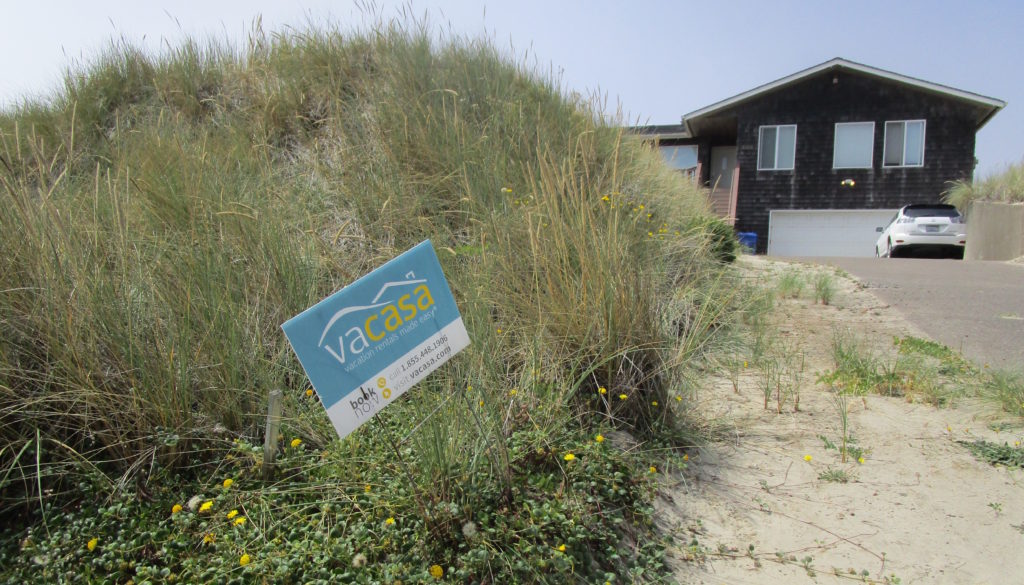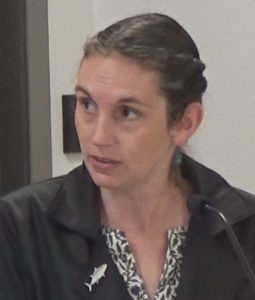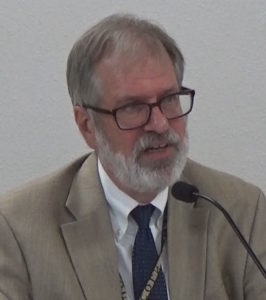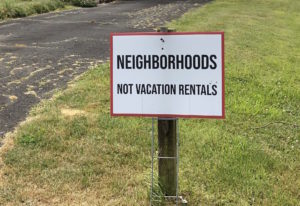
By QUINTON SMITH/YachatsNews.com
Lincoln County commissioners are promising to finally settle proposed new restrictions on hundreds of vacation rentals in unincorporated areas – except it may not be for another five months.
Faced with a deadline of Dec. 31 to end or extend a moratorium on new licenses, hold public workshops and debate and decide on a series of sweeping regulations, commissioners on Monday pushed all of those issues into next year.
A moratorium on new short-term rental licenses that originally started last spring was extended several times because the county was focused on its response to the coronavirus pandemic and September wildfires. Due to expire at the end of the month, commissioners Monday pushed the moratorium all the way to June 1, 2021.
County staff is recommending two online workshops for the public to discuss and comment on proposed regulations. Those are tentatively scheduled for 6 p.m. Jan. 12 and 6 p.m. Jan. 20.
If the county is satisfied about what it hears, County Counsel Wayne Belmont suggested a board discussion Feb. 22 with a final decision in March.
But given nine months of responding to coronavirus and wildfire emergencies, commissioners Monday were skeptical of resolving a contentious and complicated issue in the first three months of the new ear.

“We’ve had to delay and delay again … I get that … but I want to make sure we can get the work done this time,” said commission chair Kaety Jacobson, suggesting more time to wrestle with the issues.
Commissioners Doug Hunt and Claire Hall agreed, urging Belmont and his staff to tightly focus the issues they want the public to comment on. Hunt also thought wrapping up the issue during the first 90 days of 2021 was unrealistic.
Jacobson then suggested a deadline at the end of May “to give us an extra 60-day buffer, given the year we’ve had.”
Hunt proposed June 1, and his motion was approved unanimously.
The other looming factor not mentioned in commissioners’ discussion Monday, is an initiative petition being circulated by opponents of short-term rentals proposing to phase out vacation rentals in unincorporated county if they are in a residential zone. If it gets enough signatures, it could land on either the May or November ballot.
Staff proposes tighter rules
There are 576 licensed short-term rentals in unincorporated areas – land outside the seven cities in Lincoln County, many of which have their own limits and different regulations.
County commissioners and staff have been trying to work on new regulations or approaches to dealing with the burgeoning number of vacation rentals in unincorporated areas for 1½ years. But from March to November that work mostly stopped as the county focused on coronavirus and wildfire emergencies.

In November, Belmont came back to commissioners with suggestions in 4-5 areas of regulation that represented much further tightening than when commissioners last discussed the issues nine months ago.
Belmont and county staff is now recommending commissioners discuss:
- Requiring all septic systems serving short-term rentals to be inspected to see if they are working properly, and for inspectors to determine the capacity of each system. Staff had previously recommended inspections for just those rentals without current county septic permits. Belmont said such inspections would help establish an occupant capacity for each rental “no matter what is authorized under the code.”
- Limiting a rental’s maximum occupancy – with a few grandfathered exceptions — to two people per bedroom. If the rental has three bedrooms, the maximum capacity would be six, for example; if four bedrooms, the capacity would be eight. The proposal would also have occupancy limits in effect day and night, which would stop the rental from being used for large gatherings or events, Belmont said. The county currently has one of the most lenient occupancy rules in Oregon – allowing three overnight guests per bedroom plus two others. A three-bedroom rental could legally have 11 people stay there, for example. “This single change, in our view, will do more to lessen the possible issues with parking, noise and garbage (less people = less impact) than any other action you take,” Belmont wrote in his Nov. 16 recommendation.
- Developing new or refining the current “three strikes” rule under which rental owners lose their license if they get three verified complaints not addressed or responded to in a timely manner.
- Decide whether to put a permanent cap on the number of licenses, debate whether there should be geographic areas in unincorporated Lincoln County with their own license caps, and, decide whether – or how to — allow licenses to be transferred to a new property owner.
Two interest groups watch closely
The county’s vacation rental debate is being closely monitored by two interest groups – 15neighborhoods, which filed the initiative petition to phase out rentals in single-family residential zones, and, ViaOregon, a newly formed coalition of vacation rental managers and owners opposed to license limits and a possible phase out.

Monica Kirk, a 15neighborhoods leader who lives in the Miroco area south of Depoe Bay, said Tuesday she appreciates the commission’s attempt to get the issues right.
“We really trust this board of commissioners,” Kirk told YachatsNews. “If they had decided they had enough information they would have done something (Monday). Clearly, they did not.”
“The organization is optimistic and grateful,” she said. “The extra time will help.”
Members of ViaOregon have a different view. Once they heard commissioners would be discussing the vacation rental issue Monday, they flooded them with emails pressing their case. The group has commission an economic study of short-term rentals in the county and said in a letter to commissioners that vacation rentals generate more than 3,600 jobs, $192 million in wages, and pay $11.7 million a year in lodging taxes to the county and its seven cities.
ViaOregon members, in emails to commissioners, also urged the county to set up a mandatory mediation process for neighbors and vacation rental owners to iron out local issues and that the county lacked specific data on complaints. The group also suggested if there is a cap on licenses, that it be focused on properties valued lower than the median home prices in Lincoln County in an effort to preserve workforce housing.


